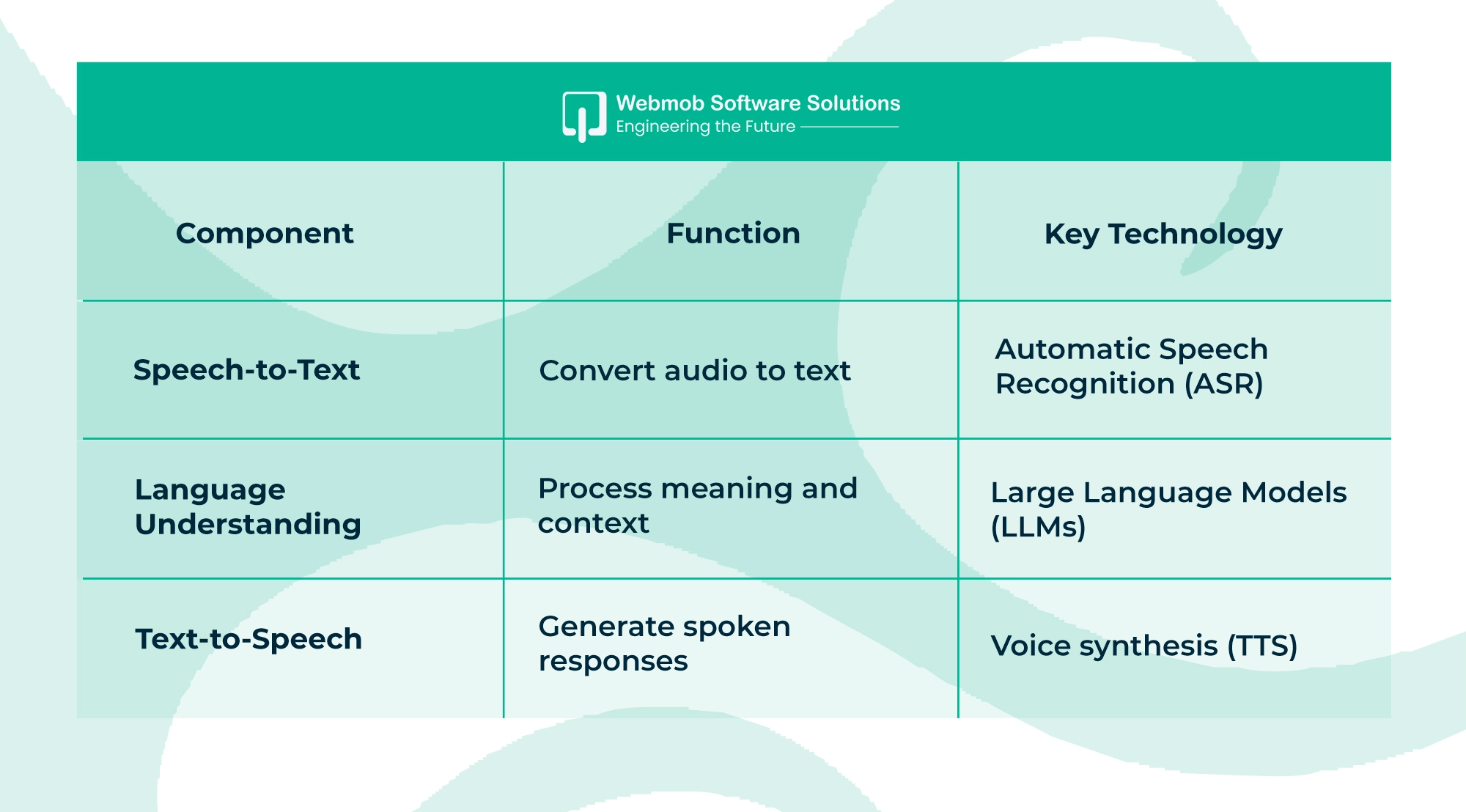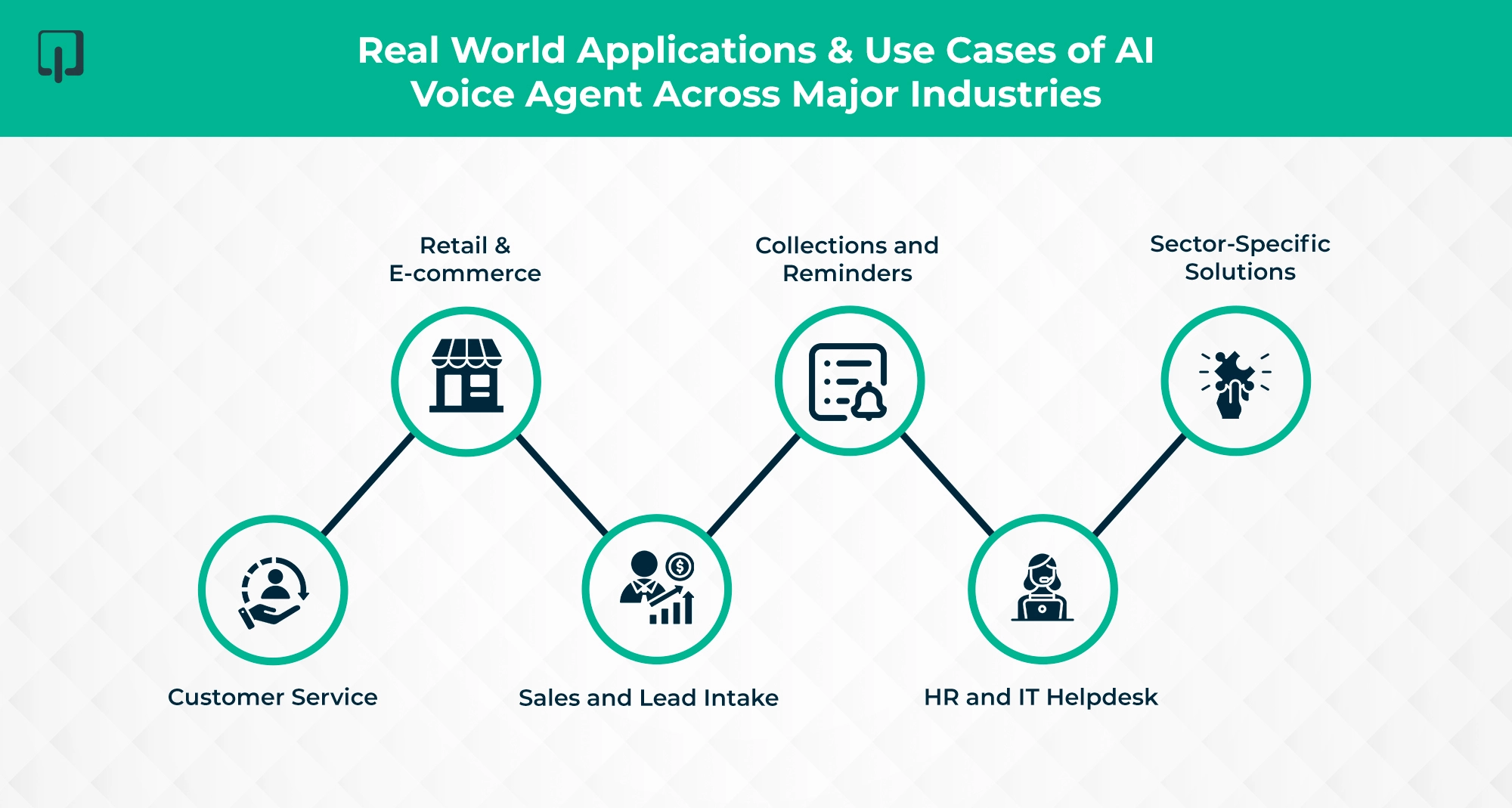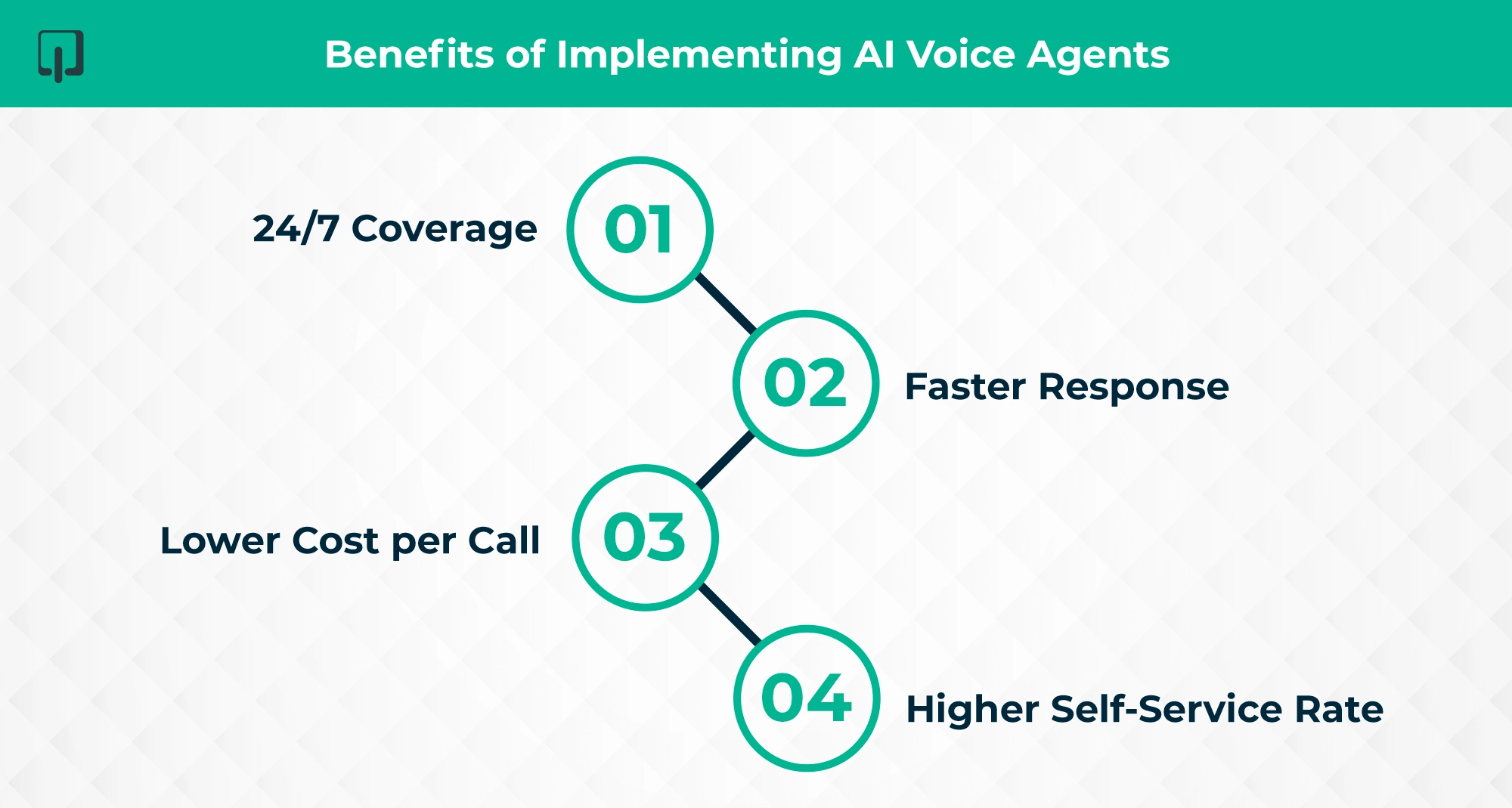November 13, 2025
Lorem ipsum dolor sit amet, consectetur adipiscing elit. Suspendisse varius enim in eros elementum tristique. Duis cursus, mi quis viverra ornare, eros dolor interdum nulla, ut commodo diam libero vitae erat. Aenean faucibus nibh et justo cursus id rutrum lorem imperdiet. Nunc ut sem vitae risus tristique posuere.
In today's business world, every interaction matters. Whether it's answering customer queries, assisting with sales, or guiding employees through simple tasks, the way you engage with your clients and team can make a significant impact on your bottom line.
That’s where AI voice agents come in. These powerful tools enable businesses to automate conversations, offering efficient, scalable, and cost-effective methods for handling a range of tasks. You might have heard about them in the context of customer service or sales, but what exactly are they?
In this guide, we will explore the key aspects of AI voice agents, their benefits, how they work, and how businesses can leverage them to enhance operations. Let’s break it down.
At their core, AI voice agents are software systems that use artificial intelligence to interact with users via voice. They differ from traditional voice assistants, such as Siri or Alexa, in that they are designed to handle specific tasks within business environments. For example, AI voice agents can manage customer service inquiries, process orders, handle support tickets, or assist with HR-related tasks (see our AI Development Services).
You may be familiar with Interactive Voice Response (IVR) systems, but AI voice agents go beyond this. Unlike traditional IVR, which follows pre-programmed menus, AI voice agents use natural language processing (NLP) to understand and respond conversationally (learn more: IBM’s guide to voice AI).
Several key technologies power AI voice agents:
These technologies combined allow the AI voice agent to function intelligently in real-time, providing smooth and natural conversations.

AI voice agents function much like a live conversation, but with automation at its core. The process typically follows this flow:

For AI voice agents to be effective, they need to operate with low latency. Conversations need to flow smoothly without noticeable delays. Real-time processing is crucial for enhancing the user experience, especially in scenarios such as customer service, where waiting too long for a response can significantly impact satisfaction.
Moreover, features such as barge-in (allowing users to interrupt the agent) and turn-taking (enabling the conversation to feel more natural) are essential for maintaining fluid interactions.
AI voice agents can also retain context throughout the conversation, making interactions feel more coherent and natural. For example, if a customer asks a follow-up question, the agent can remember the previous inquiry and provide a relevant response. This is accomplished by grounding the conversation in a knowledge base and using memory to track interactions.
Check our AI Chatbot Use Cases.
While AI voice agents are increasingly capable, there are always situations where human intervention is required. A good AI system includes guardrails that allow it to seamlessly hand over the conversation to a live agent when necessary. This ensures that users are never left hanging if the AI cannot provide a satisfactory solution.
AI voice agents have proven to be highly versatile across industries. Here are some of the key applications:

One of the most common use cases is customer support. AI voice agents can handle Level 1 (L1) support, answering frequently asked questions (FAQs), providing order statuses, and managing returns. With AI voice agents for customer service, businesses can reduce wait times and lower call center costs while improving customer satisfaction.
AI voice agents can be used to qualify leads, schedule appointments, and even follow up with potential customers. For businesses seeking to scale their sales efforts, utilizing an AI voice agent platform for lead intake can streamline the process, enabling human agents to focus on more high-value interactions.
Many businesses use AI voice agents for collections and payment reminders. These agents can reach out to customers for overdue payments, renewal reminders, and subscription updates, ensuring that such tasks are handled efficiently and without delay.
HR departments can deploy AI voice agents to handle employee queries about company policies, benefits, or payroll. Similarly, IT helpdesks can use AI agents for password resets, ticket creation, and troubleshooting basic issues.
From healthcare (e.g., appointment scheduling) to banking (e.g., transaction status updates) and retail (e.g., order tracking), voice agents are finding applications across sectors. Logistics companies are also utilizing voice agents to manage tracking and delivery queries.
Here are some key benefits of using AI voice agents to enhance customer support and operational efficiency.

When choosing an AI voice agent, make sure the platform includes:
You can either build a custom AI voice agent in-house or buy an off-the-shelf AI voice agent platform.
Pros: Faster time to market, less development effort, and ongoing updates.
Cons: Limited customization options and reliance on a third-party vendor.
Pros: Tailored to your business’s specific needs, full control over the platform.
Cons: More expensive, requires more time and resources.
Some businesses opt for a hybrid approach, utilizing a ready-made platform and customizing it with specific skills or integrations to meet their unique needs.
Consult with our AI integration team to discuss your needs.
Successful implementation of an AI voice agent involves several stages:
The first step in implementing an AI voice agent is through discovery. This stage involves identifying your primary use cases, success criteria, and the specific objectives you aim to achieve with the system. Whether it's improving customer service or automating sales processes, defining clear goals upfront ensures that your AI voice agent is tailored to meet your business needs effectively.
Next, prepare your data by organizing existing documents, frequently asked questions (FAQs), product details, and support content. The more structured and accessible your data, the better your AI agent will perform. This step ensures that your AI voice agent has the necessary resources to provide accurate, helpful, and contextually relevant responses to users.
During the design phase, map out the conversation flows and escalation paths. This involves detailing how the AI will interact with users, how it will respond to various queries, and when it should escalate the issue to a human agent. Thoughtful design ensures that the interaction is seamless and efficient, providing users with a consistently smooth experience.
Once the design is complete, move to the testing phase. Conduct sandbox calls and QA testing to ensure the AI voice agent operates as expected under different scenarios. Test for accuracy, responsiveness, and user satisfaction to identify any areas for improvement before rolling out the system more widely.
Before rolling out a full-scale solution, conduct a pilot with a select group of users to test its effectiveness and identify any issues that may arise. This controlled trial will allow you to gather valuable feedback and assess the system’s performance in a real-world environment. Use this phase to fine-tune the AI agent, adjusting based on user interactions and overall system performance.
Finally, begin the gradual rollout of the AI voice agent to a broader audience. Monitor the system's performance closely during this phase, tracking key metrics such as call deflection rates, response accuracy, and user satisfaction. This enables you to ensure that the system scales effectively and continues to meet your objectives as it serves an increasingly larger group of users.
Partnering with an AI voice agent development company can significantly enhance your AI initiatives by bringing expertise and experience to the table. A reliable partner will not only assist in the seamless integration of voice agents into your business but will also help design a solution tailored to your unique needs. They can guide you through the entire process from initial concept and design to deployment and ongoing optimization, ensuring that the system remains robust, scalable, and aligned with your business goals.
Book a free discovery call with our experts.
As AI voice technology continues to advance, multimodal agents are set to become more common. These agents will combine voice with other input methods, such as screens, visual cues, and links, to create a richer, more dynamic user experience. Additionally, real-time translation and code-switching are emerging trends, enabling voice agents to serve global markets more effectively by adapting to multiple languages and cultural nuances in real time. These innovations will make AI voice agents even more versatile, enhancing their value for businesses operating in diverse regions.
AI voice agents are not intended to replace human agents fully. Instead, they handle repetitive tasks, such as responding to common queries or processing straightforward transactions. This allows human agents to focus on more complex, higher-value interactions that require empathy, decision-making, or specialized expertise, ultimately improving efficiency across the board.
AI voice agents are increasingly capable of understanding various accents and dialects, thanks to advancements in Automatic Speech Recognition (ASR) and Natural Language Understanding (NLU). While accuracy continues to improve, the effectiveness of these agents depends on the quality of the training data and the technology used. Expect continued improvements in accent recognition and understanding.
Yes, most AI voice platforms are designed for easy integration with your existing systems, such as CRMs, ERPs, and telephony infrastructure. This ensures that your AI voice agent can seamlessly interact with customer data, track interactions, and access relevant information, making the entire process more efficient without disrupting your current tech stack.
If you're using a pre-built AI voice platform, you could go live within a few months, as these solutions are designed for quick deployment. However, if you're opting for a fully customized AI voice agent tailored to your business. In that case, the process will take longer, typically requiring several months to ensure thorough development, testing, and deployment.
Maintaining your brand's voice through AI voice agents requires careful training on your company's tone, language, and communication style. Regular monitoring and fine-tuning of interactions are essential to ensure that the AI agent aligns with your brand's messaging. Continuously updating the agent with new data and feedback helps preserve consistency and accuracy in its responses.

AI voice agents are no longer a distant vision; they are here, revolutionizing the way businesses engage with customers and streamline operations. Whether it's enhancing customer service, driving sales, or optimizing internal processes, AI voice agents deliver tangible value across various functions.
At Webmob, we specialize in helping businesses integrate AI voice agents that are tailored to their specific needs. Whether you decide to purchase a ready-made platform or work with an AI voice agent development company for a custom solution, the right strategy is key to success. As AI technology continues to evolve, the potential of voice agents will only expand.
So, why wait? It's time to embrace the future and integrate AI voice agents into your business. The future is already speaking; let's make sure you're listening.
Copyright © 2026 Webmob Software Solutions